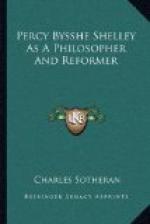At the time of this outrage Shelley was in Italy; in consequence of it his attention was concentrated more than previously on the labor question, and he immediately composed half a dozen in spiriting poems, full of the fire of genius; in one of which he calls, with a voice of thunder, to the
I.
“Men of England! wherefore plough
For the lords who lay ye low?
Wherefore weave, with toil and care,
The rich robes your tyrants wear?
II.
Wherefore feed and clothe and save,
From the cradle to the grave,
Those ungrateful drones who would
Drain your sweat—nay, drink your blood?
III.
Wherefore, bees of England, forge
Many a weapon, chain, and scourge,
That these stingless drones may spoil
The forced produce of your toil?
IV.
Have ye leisure, comfort, calm,
Shelter, food, love’s gentle balm?
Or what is’t ye buy so dear
With your pain, and with your fear?
V.
The seed ye sow, another reaps;
The wealth ye find another keeps;
The robes ye weave, another wears;
The arms ye forge, another bears.
VI.
Sow seed—but let no tyrant reap;
Find wealth—let no impostor heap;
Weave robes—let not the idle wear;
Forge arms—in your defence to bear.
VII.
Shrink to your cellars, holes, and cells;
In halls ye deck, another dwells.
Why shake the chains ye wrought? Ye see
The steel ye tempered, glance on ye!
VIII.
With plough and spade, and hoe and loom,
Trace your grave, and build your tomb,
And weave your winding sheet, till fair
England be your sepulchre!”
By far the finest composition brought out by this occasion was the “Masque of Anarchy,” a magnificent poem of ninety-one verses. “Anarchy” he describes as riding “on a white horse,"[E] in alliance with theology and statecraft, and whose admirers were “lawyers and priests.”
[Footnote E: This doubtless alludes to the House of Hanover, the principal charge on whose armorial bearings is a white horse.]
After a series of powerful delineations, he describes slavery and freedom, justice, wisdom, peace and love, in exquisite terms. Then he turns to their lamps—science, poetry, and thought, which make secure “the lot of the dwellers in the cot.”
He advises—That, on some spot of English ground, should be convened a great assembly of the fearless and the free, who shall come from the bounds of the English coast, and from every hut, village, and town, where, for other’s misery and their own, they live, suffer, and moan. Also,
“From the workhouse
and the prison,
Where, pale as corpses
newly risen,
Women, children, young
and old,
Groan for pain, and
weep for cold;




